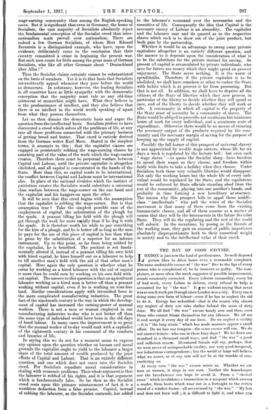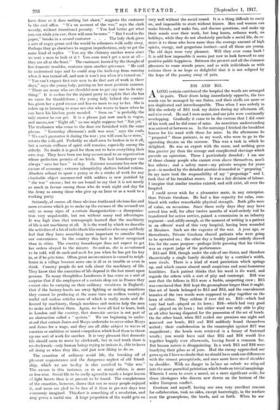THE DAY OF GOOD EXCUSES.
LONDON is just now the land of good excuses. No well.disposed person likes to drive home even a reasonable complaint. The same undeniable excuse of "the war" flies to tho lips of every person who is complained of, be he innocent or guilty. The corn. plainer, or more often the meek suggeater of possible improvement, stands constantly corrected. Every inferior commodity, every bit of bad work, every failure to deliver, every refusal to help, is accounted for by "the war." It yes without saying that never vases much work got through since London was a city. Every one is doing some new form of labour—even if be has to neglect the old to do it. Energy has redoubled—that is the reason why almost any neglect of duty can take shelter behind the mass of duty done. We all find "the war" excuse handy now and then, even those who cannot blame themselves for any idleness. We all use it and accept it every day of our lives. Do we neglect a civility —it is " the long strain " which has made manners appear a small affair. Do we lose our tempers—the same excuse will run. We do not answer letters—who can in these buoy days ? We let down our standard in a thousand small ways, and find "the war" a good and sufficient reason. Ill-natured friends will say, perhaps, that we were never of unimpeachable civility, nor very good-tempered, nor industrious correspondents ; but the world at large-will believe what we assert, or at any rate will not bo at the trouble of con- tradieting us.
At every turn "the war" excuse meets us. Whether we- are men or women, it rings in our ears. Neither the housekeeper nor the breadwinner can hope to avoid it. From a " clerical error" which invalidates a transaction to a misprint which amuses a reader, from boots which wear out in a fortnight to the rotten wood of a window-frame—all are excused by " the war." " My last coal does not burn well ; it is- difficult to light it, and when you
have done so it does nothing but shoot," suggests the customer in the coal office. " It's on account of the war," says the clerk wearily, without intentional jocosity. " You had better get what you can while you can, there will soon be none." " But I read in the paper," breaks in a second customer . . . The lady clerk gives a sort of angry groan and the would-be reformers walk sadly away. Perhaps they go elsewhere to suggest imperfections, only to get the same kind of replies "You say the chimney smokes worse since we sent a man to look at it ? You soon won't get a man at all— they are all at the front." The customer, harricel by the thought of her domestic troubles, ventures upon another grievance. " Ho said be understood taps and he could stop the bath-tap from running when it was turned off, and now it won't run when it's turned on." " You can't expect first-rate men to do that sort of work in these days," says the young lady, putting on her most patriotic manner. " Them are many who are thankful now to get any one to do any- thing." It is useless for the injured party to explain that she has no cause for thankfulness ; the young lady behind the counter has given her a good excuse and has no more to say to her. She is taken up in listening to some one else who wants to know when he can have his kitchen grate mended. " Soon on" is probably the only answer he can got. It is a phrase just now much in vogue, and means, not "Right off," as one might suppose, but "Not yet." The tradesmen who come to the door are furnished with the same phrase. " Yesterday afternoon's milk was sour," says the cook. " Wo can't guarantee it during the war ; you will soon have none," retorts the milk-girl. Probably we shall soon be broken in to it all, but a certain stiffness of spirit still remains, especially among the elderly. No doubt it is geed for them not to have everything their own way. They hare been too long accustomed to an organization whose perfection permits of no hitch. The bed housekeeper can always " save her face " to-day. Extreme meanness has now the excuse of economy ; extreme inhospitality shelters behind rations. Absolute refusal to spare a penny or do a stroke of work for any charitable object unconnected with soldiers is now justified by "the war" excuse ; but we are bound to say that it is not nearly so much in favour among those who do work night and day for the Army as among those who give up an hour or so a week to a working party.
Seriously, of course, all these obvious truthsand obvious lies and mere evasions which go to make up the excuses of the accused are only no many signs of a certain disorganization—a disorganiza- tion very unpalatable, but not without many real advantages. It was high time that townspeople learned that the machinery of life is not machinery at all. It is the word by which we describe the activities of a lot of individuals like ourselves who may suddenly feel that they have something more important to consider than our convenience. In the country this fact is better recognized than in cities. The country housekeeper does not expect to get her orders obeyed to the minute. So-and-so, she is accustomed to be told, will do such-and-such for you when he has got his hay in, or if he gets time. Often great inconvenience is caused to neigh- bours in a village because some one is ill or in trouble or even in drink. Country people do not talk about the machinery of life. They know that the amenities of life depend in the last resort upon persons. TO many thoughtless Londoners it has come as a sort of surprise that if tho employees of a certain shop are in Prance they cannot also be carrying on their ordinary vocations in England ; that if the factory-hands are away fighting or making munitions they cannot be producing at the same time an endless variety of useful and useless articles now of which is really made and de- livered by machinery, though machines and motors help the men to make and deliver them. Again, we have all had to learn, both in London and the country, that domestic service is not part of an abstraction called a " system." We are beginning to under- stand that certain Janes and Marys undertake to serve other Marys and Janes for a wage, and they are all alike subject to was-es of emotion or ambition or moral compulsion which lead them to throw up one sort of work for another. It is very pleasant that domestic life should seem to move by clockwork, but in real truth there is no clockwork—only human beings trying to imitate it, able to leave off doing so when they like, and just now liking to do so.
The cessation of ordinary serial life, the breaking off of pleasant acquaintance and the dangerous neglect of old friend. ship, which we see to-day is also ascribed to "the war." The excuse in this instance, as in so many others, is more or leas true. Social life to be really agreeable needs a larger leaven cf light hearts than is at present to be found. The completeness of the cessation, however, shows that not so many people enjoyed it, and more are glad to be free of it than in pre-war days was commonly imagined. This dart is something of a revelation, and may prove a useful one. A large proportion of the world gets on very well without the social round. It is a thing difficult to carry on, and impossible to start without leisure. Men and women can make friends, and make fun, and discuss questions, and make up their minds over their work, but long hours, arduous work, no holidays, while they do not absolutely preclude a social life, do re- strict it to those who have more than the average amount of high spirits, energy, and gregarious instinct—and all those are young. The old days were very pleasant. Will they ever come back ? It is odd how impossible it seems juet now to look forward to any positive public happiness. Between the present and all the common pleasures to come stands peace, and as with individuals so with nations there is no hope so delightful that it is not eclipsed by the hope of the passing away of pain.



































 Previous page
Previous page